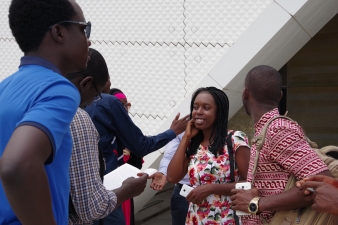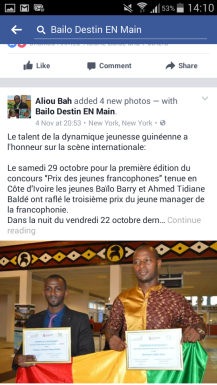
Fatoumata Kebe presenting her project to teach astronomy to children in suburbs of Paris, 29-10-2016 @Mirjam
“We see the rise of a new generation of digital natives today. Our task must be to empower a new generation of digital citizens at the global level – starting with education, new intercultural skills, and deeper media and information literacy.”
Speaking is UNESCO Director-General Irina Bokova during a conference held in Canada in 2015. Her remark epitomizes the approach to youth in the project and policy field.
The Android Youth is both seen as the future of and a threat to ‘our’ world which is funded on a belief in democracy, equality and welfare for all. This ideal world and the norms and values behind it are driving discussions about the pathways for youth and the policies that accompany them. In the context of the fight against terrorism and radicalization, the youth, especially the massive numbers of young people in Africa (an estimated >60% of the population) and in sub-urban spaces in Europe and the USA, are considered a potential threat to the world order. There is quite a number of young people who no longer believe in the legitimacy of the models that have shaped their states. The search for social, economic, and political identities, has become central to their lives. The advancement of ICTs, including social media, has made this a far more complex matter: Facebook has become one of the major communication and search tools for youth all over the world.
Hopeless
For many of the youth we are referring to here, in countries like Chad, Mali, and Senegal, it is not easy to access roads to prosperity. The norms, values, and opportunities of rural livelihoods do not match with the aspirations of the often urbanized youth – also in rural areas youth is increasingly used to urban lifestyles, a.o. because of their access to internet.
Instead, they are confronted with ideas, new styles, with hopes for different futures condensed in the advertisements of mobile telephony companies, the beer advertisements, and also by discourses by politicians watched on TV, or accessed through the social media. One such discourse is about youth migration towards Europe that resonates their hopelessness and their difficult search for identity. African and European media have made this into one of their major discourses, obscuring others.

Android Youth
Competition
My recent observations however, do reveal another tendency that could steer the youth discourse in a different direction: the appearance of competitions for innovative and business-like initiatives of youth. This resonates with ‘development’ approaches that no longer talk about projects, but businesses, innovations, and social entrepreneurship. I observed some of these ‘competitions’ closely, like the start-up award of Total, the start-up competitions of Reach4Change (which I assisted in N’Djamena, the capital of Chad), pushing the youth into competition to carve out a prosperous future. Access to these competitions is through internet and social media, Facebook in particular. The procedures around these prizes are entirely ‘Facebooked’. On 29 October I was present at the first award ceremony in Abidjan of again another new initiative: the prix de la Francophonie 35>35 in which 35 youth aged between 18 and 35 compete.
This is how the competition was announced:
L’Appel à candidatures court du 17 février 2016 au 31 mai 2016 sur le site web : www.francophonie3535.com. Au 31 mars, la plateforme enregistrait 900 visiteurs en moyenne/semaine sur le site web : www.francophonie3535.com.
Hence only accessible for innovative Android Youth!
First steps
Richard Seshie, the organizer of the Prix de la Francophonie, is himself a youth entrepreneur. He represents those who have studied abroad and set up enterprises abroad but decided to come back to give it a try in their home country. For Seshie this is Côte d’Ivoire. Here, he aims to combine event management with a social and engaged component. This event that he linked to the Francophonie, the international organization that unites the countries where French is one of the main languages, sprang from his creative and entrepreneurial brain. He did not yet get the support that he wishes, but the start is there. Microsoft was one of the main supporters of his initiative; for them a chance to access the Android Youth. He does his best to give his event publicity, for example by linking it to other events and writing press releases. Despite the organizational flaws of this first edition Richard promises to give a lot of attention to the winners and has high hopes that they will be connected to a different business world through this prize. But, what is probably more important, he is convinced of the idea. This is for him the way forward!

The candidates with their certificates @Joky
Innovations
The 29th was a chance to meet these Android innovators. I was amazed by all their stories. The crème de la crème of the Francophone world together, from countries as diverse as Burkina Faso, Senegal, Chad, Côte d’Ivoire, Benin, Mauritius, Togo, Vietnam, USA, Mali, etc. They had all come on their own expense to join the ceremony of the Francophonie 35th we already had a chance to listen to the thrilling story of the banker from Mauritius who decided that life needed something more than banking and started to work with blind children. Amazing was the Malian/USA lady, Fatumata Kebe, who closed her presentation with her plea for teaching astronomy to children in Parisian suburbs. She was awarded with the Super Prix de l’Initiative Féminine Jeune Francophone de l’année. I later met the two amazing Guinean men who developed their video activisms ‘Destin-en-Main’, and the Cameroonian young man who lives in Ouagadougou and turns plastic garbage into isolation material for houses.

Winner of the Super Prix! @Richard Abidjan TV
Also an amazing story of the Nigerian lady, with a pastoralist background, who developed a system to produce animals’ food, and finally the Chadian Didier Lalaye, who we met earlier in some of my previous blogs with his project Dawa m-health that brings health to people in remote areas. He won the super prix: Jeune Personnalité Francophone de l’Année.
They are all innovative youth, often able to travel and hence they have been confronted with other worlds and developed a vision on their own societies.  Although some of these young people are from a relatively well-to-do background, most of them are not. They are all part of worlds where it is not easy to make a living, or where most of the youth do not see how to carve out a future. They are on their way to become important people in their societies, representing alternative routes for the youth. This becomes clear from the reception of the two young men from the organization Destin-en-Main in Guinea, and the reflection of the people in Chad on their winning candidate Didier Lalaye on Facebook, on local radio and in the public discourse.
Although some of these young people are from a relatively well-to-do background, most of them are not. They are all part of worlds where it is not easy to make a living, or where most of the youth do not see how to carve out a future. They are on their way to become important people in their societies, representing alternative routes for the youth. This becomes clear from the reception of the two young men from the organization Destin-en-Main in Guinea, and the reflection of the people in Chad on their winning candidate Didier Lalaye on Facebook, on local radio and in the public discourse.
Chances and international politics
So what to think of such public events, where the innovative Android Youth of the Francophonie, most from various African countries, are caught into paths to success that have similarities to the famous idea of the ‘American dream’? How does this resonate with the ordinary youth in Abidjan, in the suburbs of Paris, in the rural hinterlands of Mali, in N’Djamena; will this message reach them at all? Is there any possibility for them to play their part in these innovations? Will the approaches of UNESCO, and many others, finally prove to be right? Will the Android Youth be the countervailing power and hence carry the message of the ‘ideology of democracy and welfare’ to the masses?
In the speech delivered by Didier Lalaye after he received his prize, he put his finger on the dilemma many youth are facing. But his speech revealed as well that these inventive youth are opinion makers and socio-political activists in their societies. He turned the question of the youth’s success into a political agenda.
‘A small rant: if we are in digital innovation, it means that somewhere we should have support of the internet but unfortunately in my country, Chad, it is since March 2016 that the government cut Internet. This is so disappointing! To all who are present here: those who might or do host the Chadian government as heroes internationally, are wrong. It is rather a government that is trying to destroy the dreams of the youth. I want you to reflect on that!
I dedicate this thing (the trophy) to all young people in Chad who do not even have the chance to post a video on YouTube. I am here because I live in Holland (to do a PhD). If I would have been living in Chad I would never have had access to the Internet as it should be!’
If the International Community wants to fight against radicalization and the end of poverty it might be best to start fighting against injustice in the ‘façade democracies’ that do not allow their youth to prosper! UNESCO and Microsoft should reconsider their roles!’

African youth first need to identify who they are and what exactly they want in this world. Then they can use the resources available to them around them to achieve these goals. In all these networking is very important for cooperation with each other.
Africa Must Work!